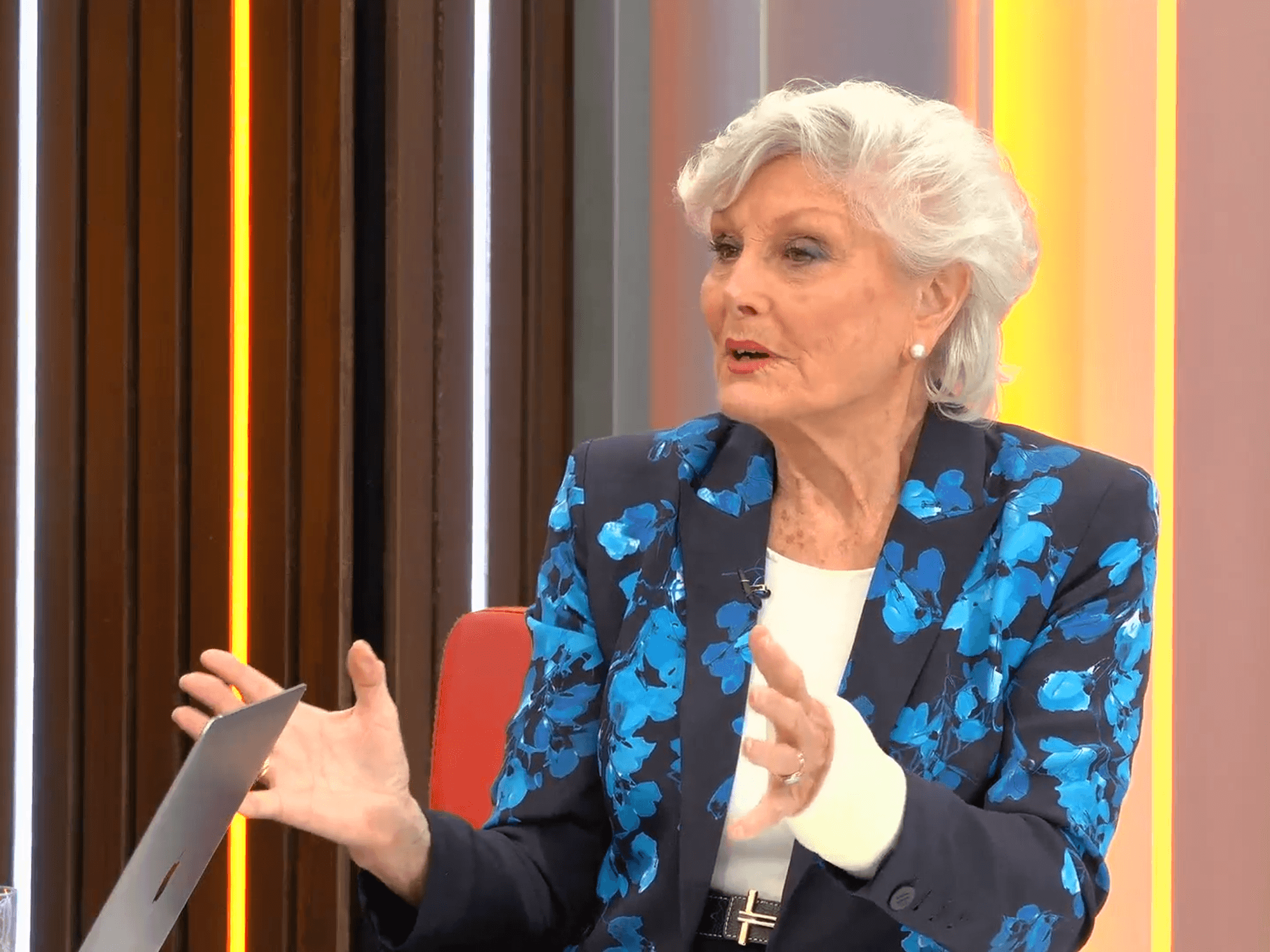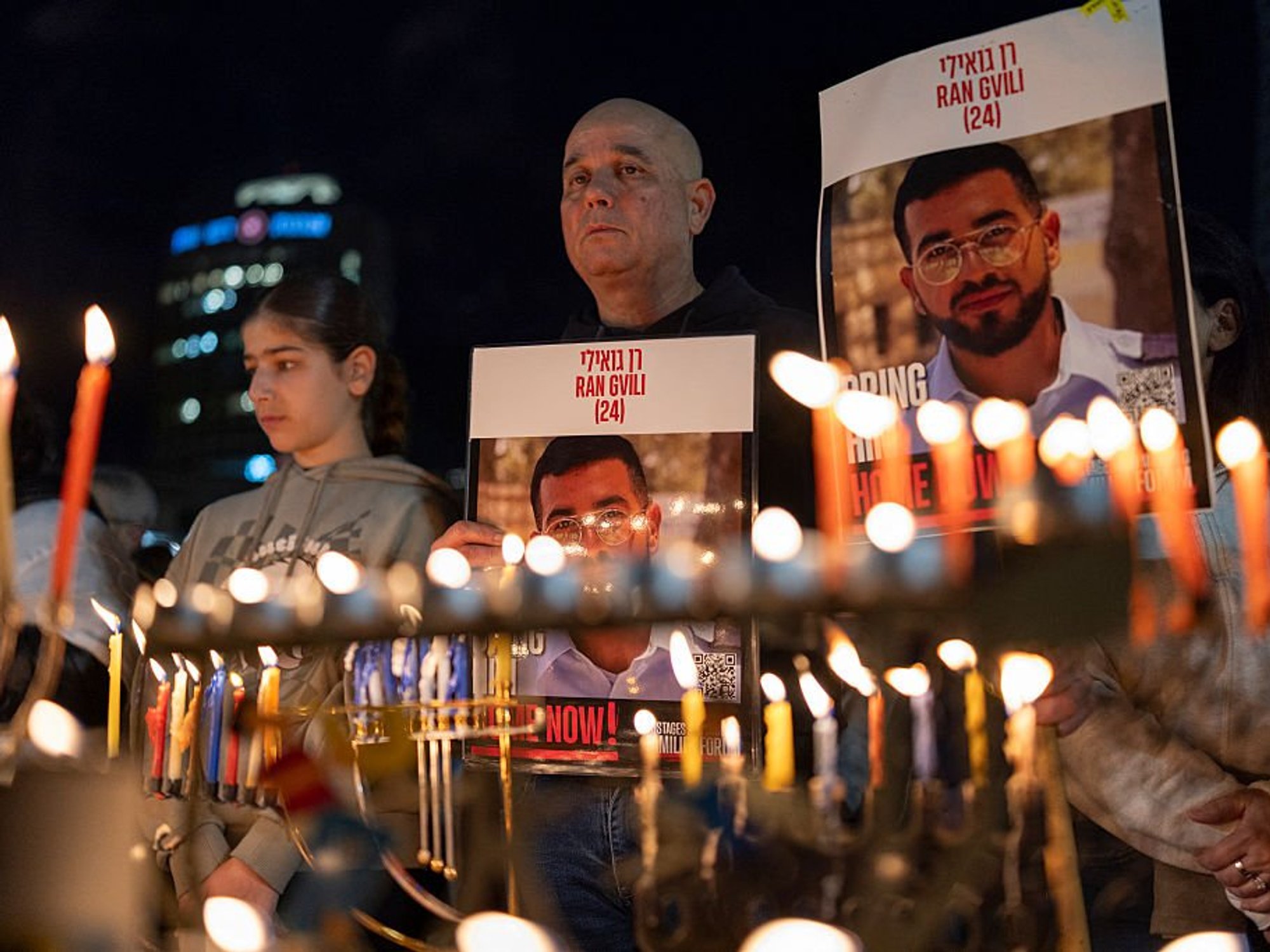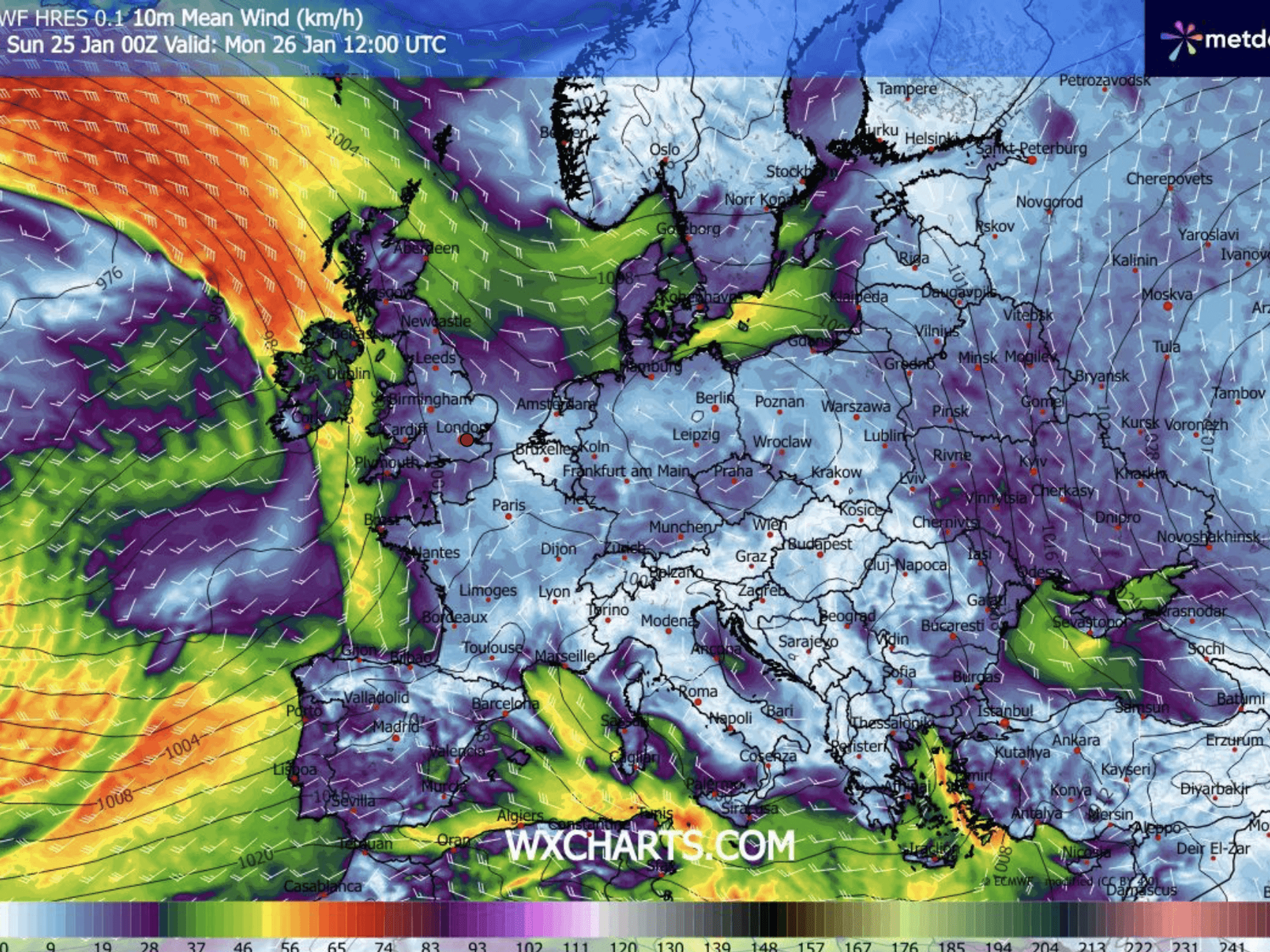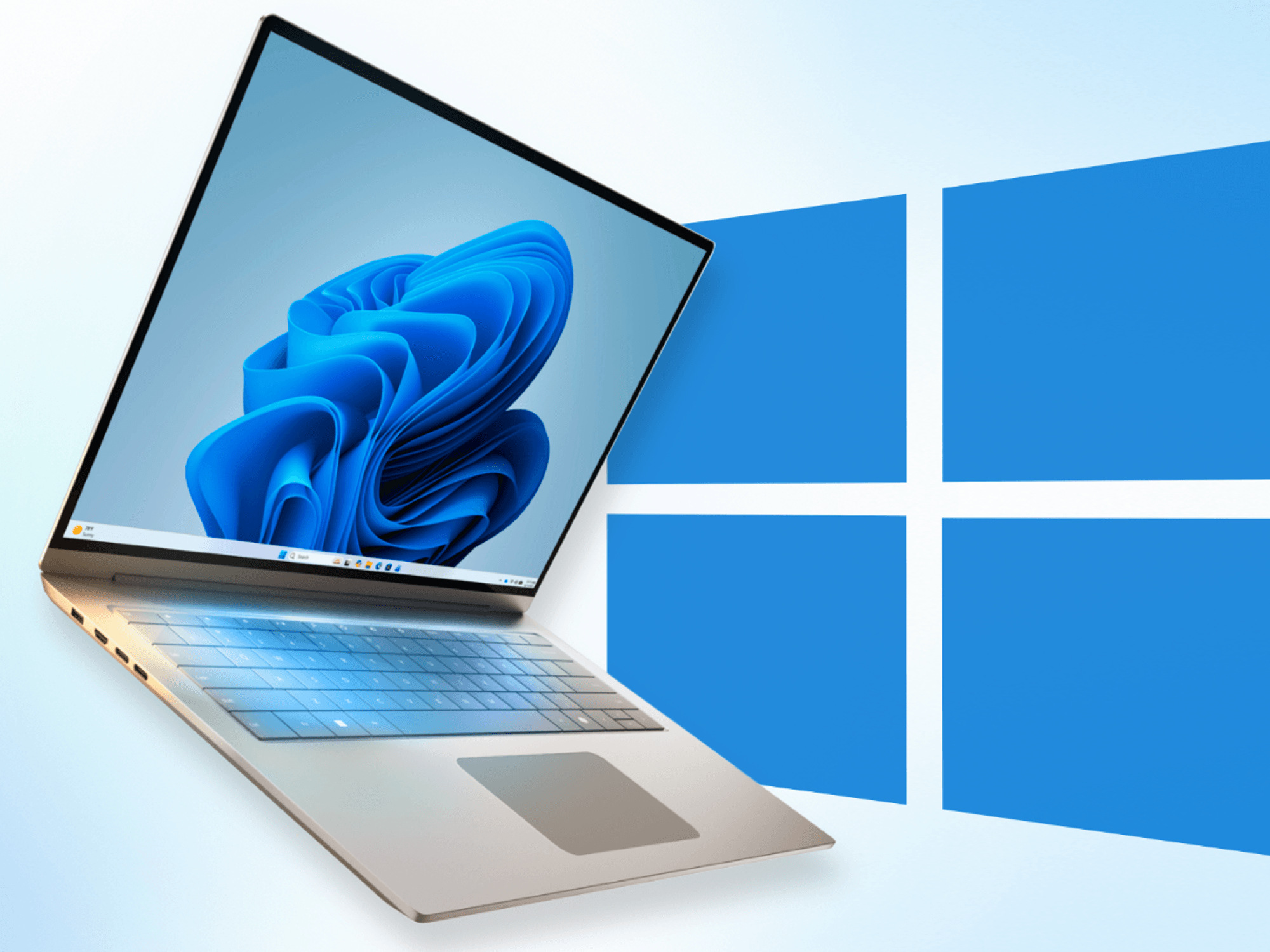VPN ban for all under-18s has support from majority of Brits, research finds in wake of Online Safety Act

A majority of UK adults support an outright VPN ban for under-18s in the UK
|UNSPLASH | YOUGOV | GB NEWS

All products and promotions are independently selected by our experts. To help us provide free impartial advice, we will earn an affiliate commission if you buy something. Click here to learn more
Just 20% believe that under-18s should still be able to use VPNs
- The Online Safety Act was passed into law in late 2023
- But came into force under the Labour Government
- It's designed to safeguard children and vulnerable people online
- Visitors must pass strict age verification checks to access content
- Pictures of passports, facial scans, credit card details are required
- Without these, hundreds of websites, mobile apps, forums are blocked
- Pornhub saw a 38% drop in daily visitors in UK, dropping by over 1million
- VPNs can be used to bypass some of these new requirements
- 55% of UK adults support a VPN ban for all under-18s in the UK
Don't Miss
Most Read
Latest
Worried about children swerving strict new age checks introduced by the Online Safety Act? You're not alone.
More than half of British adults now believe Virtual Private Networks (VPNs) should be off-limits for anyone under 18 in the UK, according to new research by YouGov. The survey found 55% of UK adults want to see the best VPN deals banned for all minors.
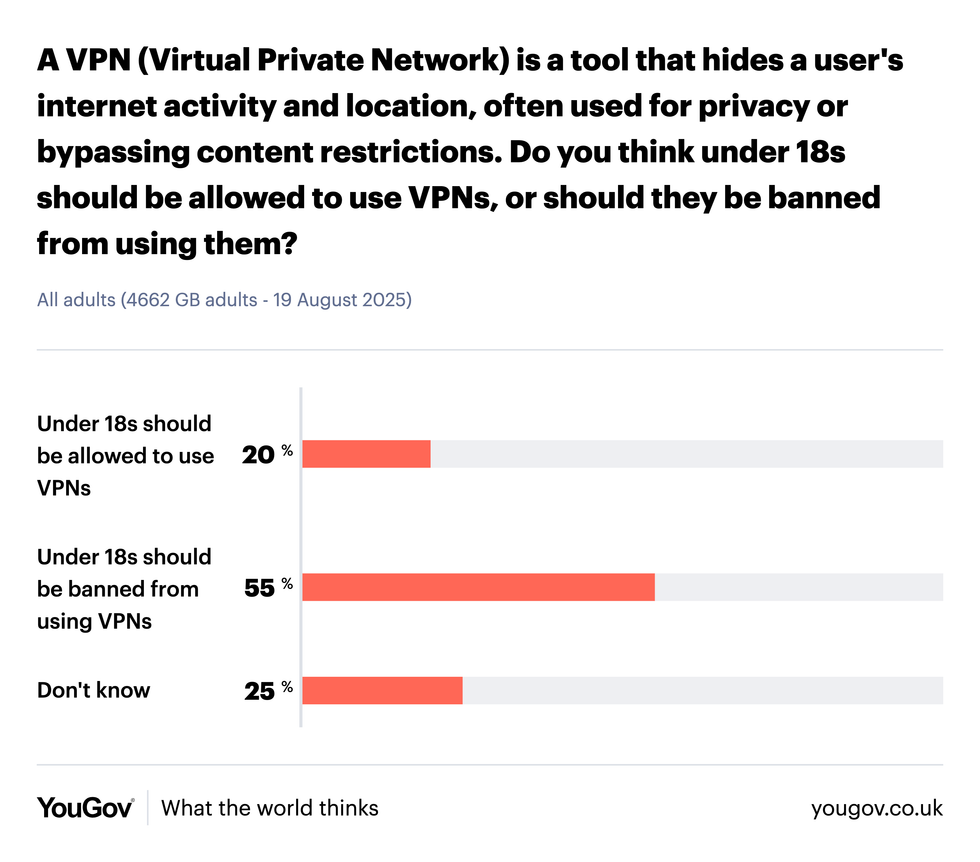
Only one-fifth of UK adults believe that under-18s should be able to download and run VPNs
|YOUGOV PRESS OFFICE
It's a response to growing fears that youngsters are using VPNs to dodge the robust age verification checks put in place by the Online Safety Act since late July. Elsewhere, researchers found that a large majority of people in the UK (69%) say they still support the new rules, including 46% who do so “strongly”.
Peter Kyle – Secretary of State for Science, Innovation, and Technology – has previously insisted there are no plans to outright ban VPNs. However, he admitted that Downing Street was looking "very closely" at how VPNs are being used.
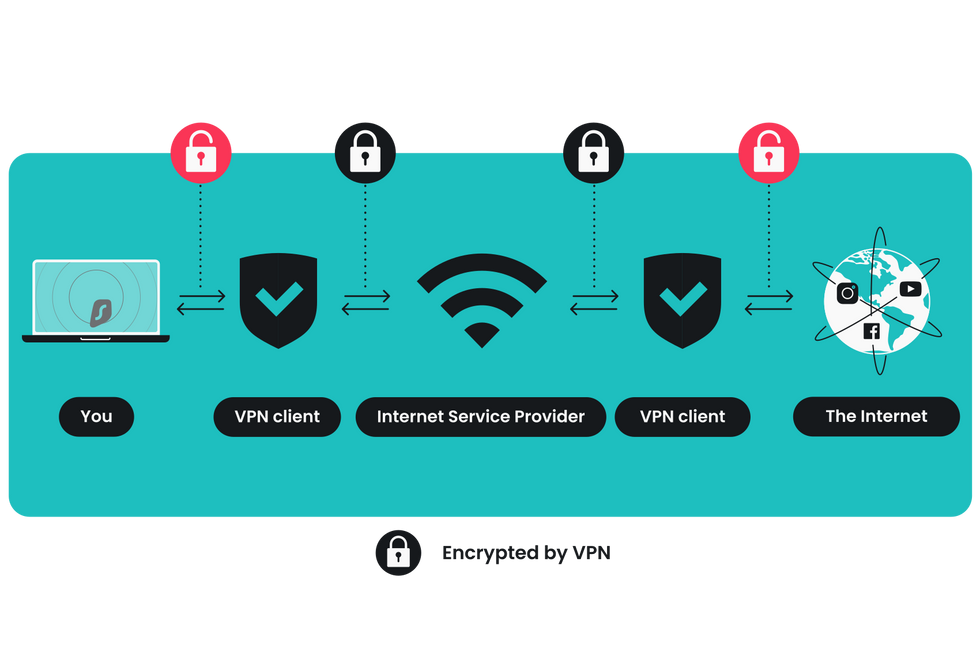
VPNs work by encrypting all of your online traffic before it's sent over the internet. This prevents your ISP, advertisers, hackers, and fraudsters from tracking your online activity, stealing your personal data, or placing restrictions on you
| SURFSHARK PRESS OFFICEIn an interview with the BBC, Peter Kyle said: "For everybody who’s out there thinking of using VPNs, let me just say to you directly — verifying your age keeps a child safe, keeps children safe in our country. So, let’s just not try and find a way around. I just want to urge caution in how people are using them."
Following the introduction of the Online Safety Act, websites, streaming services, and mobile apps that host adult content must use strict age verification checks to ensure visitors are over 18 years old. Only certain approved methods are enough to pass the age checks, including facial recognition scans, credit card numbers, and passport details.
Since VPNs let you manually spoof your IP address, making it appear as if you're accessing the internet from outside of the UK — and outside the jurisdiction of the Online Safety Act — it's possible to bypass the age verification checks. This is because platforms have only set these live in the UK, with those accessing adult websites in France and the United States unaffected by the latest shake-up, for example.
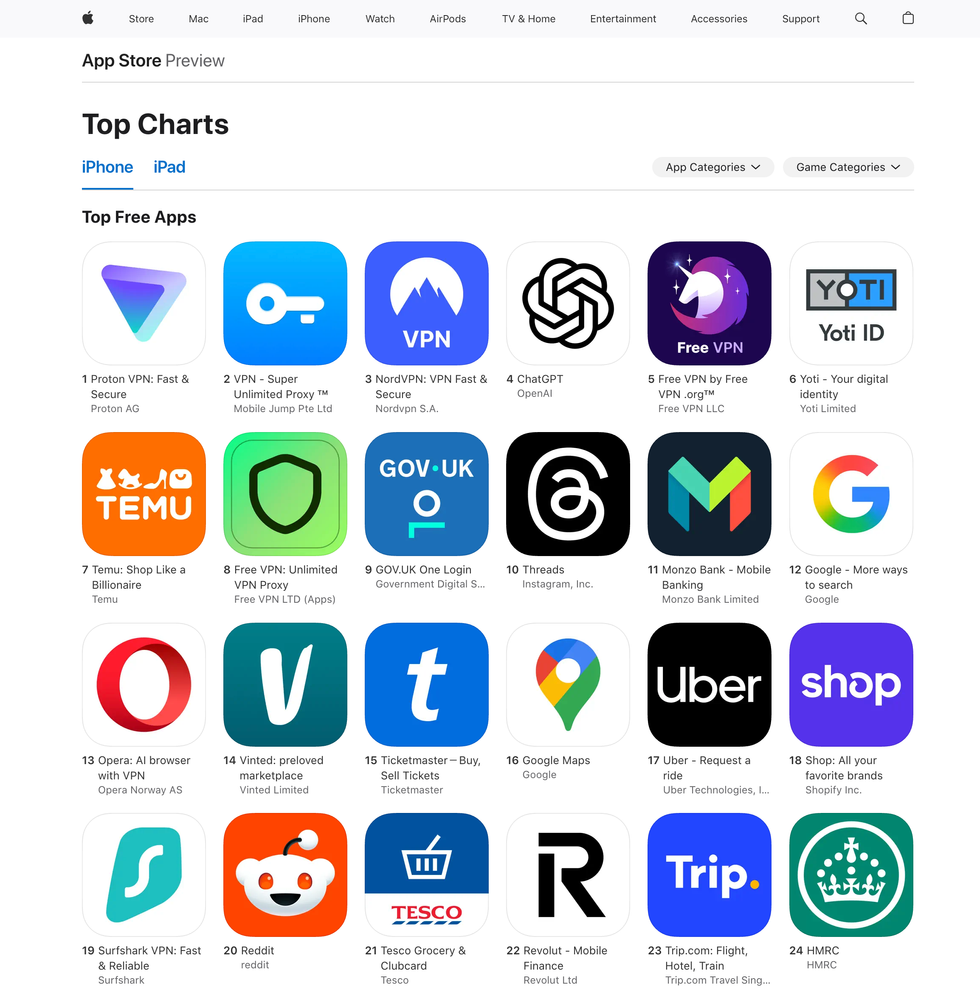
iPhone and iPad owners have raced to download VPNs from the App Store, sending multiple providers skyrocketing up the charts in the UK ...a phenomeon that's not replicated anywhere else in the world, suggesting its all down to the introduction of the Online Safety Act
| APPLE APP STORESince VPNs let you switch your location, the geographic restrictions imposed by UK law become ineffective.
It's currently legal to download and install a Virtual Private Network (VPN) in the UK, with many brands reporting massive spikes in downloads in recent weeks. Free VPNs, despite not being recommended by security experts, have also enjoyed a healthy increase in downloads.
One provider, Proton VPN, revealed that it had seen an incredible spike in UK users signing up — an almost 2,000% surge in just the first few hours after the new requirements went live.
At the time of writing, 5 of the 10 most downloaded free apps on the Apple App Store are VPNs.
The YouGov poll comes as parents and officials in the UK have grown increasingly concerned about children finding ways to access inappropriate content online. The findings reflect mounting frustration that legislative attempts to protect minors from harmful online material can still be circumvented.
Surfshark: Get 3 months for FREE + 86% off

If you're looking for some of the lowest monthly bills around, look no further than the award-winning Surfshark VPN. It's cut monthly subscription prices by a jaw-dropping 85%. Not only that, but Surfshark will also bundle an extra three months at the end of a two-year plan, dropping the effective cost to just £1.89. Surfshark lets you use your subscription across unlimited devices
Surfshark VPN
$12.29
$1.89
ExpressVPN: Get 4 months for FREE + 61% off

ExpressVPN has cut its monthly subscription by 61%. If you sign up for a 12-month plan, you'll be gifted with a generous 4 months of access to the award-winning VPN service for free. ExpressVPN includes a number of advanced features, like a password manager, that cost extra with rival providers. ExpressVPN accepts a variety of payment types, including Apple Pay and Google Pay for speedy checkout
ExpressVPN
$10.46
$4.03
Proton: Get 56% off your subscription

Created by scientists at CERN, Proton is one of the few secure, trustworthy VPN brands that offers a £0 plan. It's limited to 5 VPN server locations and a more modest download speed, but nonetheless, it's a great way to test out the service before you commit to its full-featured subscription. Upgrade to a two-year plan, Proton will slash 56% off your costs
ProtonVPN
$8.09
$3.59
The reality is that banning VPNs would be incredibly difficult to enforce.
Cybersecurity expert Graeme Stewart from Check Point compares it to "banning people from smoking in their own homes – you might not like it, but good luck enforcing it."
Only countries like North Korea, China, Russia, Iraq and the UAE currently prohibit VPN use – not exactly the company Britain typically keeps. Despite growing public support for restrictions, the practical challenges make an actual ban highly unlikely.
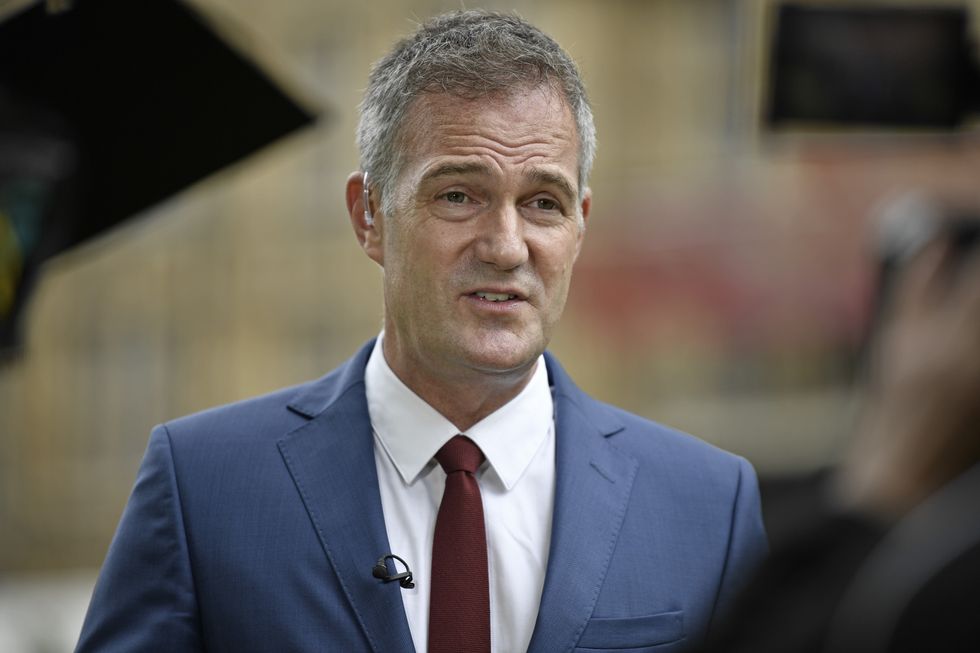 Labour MP Peter Kyle is leading the Government's efforts to safeguard children online by requiring a strict age check to acess adult content in the UK | PRESS ASSOCIATION
Labour MP Peter Kyle is leading the Government's efforts to safeguard children online by requiring a strict age check to acess adult content in the UK | PRESS ASSOCIATION What is a VPN?
VPN stands for Virtual Private Network.
Essentially, it's an application that encrypts and anonymises everything you do online — bolstering your privacy, hiding your location, and stopping advertisers, trackers, and even governments keeping tabs on you.
VPNs are widely used by businesses to keep proprietary data safe from prying eyes. Whistle-blowers and journalists also rely on these apps to shield sensitive information. And now, VPNs are fast becoming an essential tool for everyone with a smartphone, laptop, desktop PC, streaming set-top box, or tablet.
More From GB News





